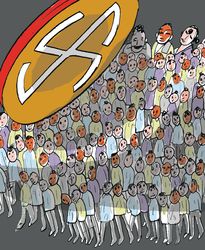Are we voting too often? The government thinks so. It has asked a committee of wise men headed by former president Ram Nath Kovind “to examine the issue of simultaneous elections and make recommendations...”
We started the democratic process in 1952 with simultaneous polls to the Lok Sabha and to the assemblies. The cycle got broken after 1967, says the law ministry resolution appointing the committee.
Wrong. The pattern had got upset in 1959 when Kerala’s 1957-elected assembly was dismissed mid-term, and polls ordered. By the end 1960s, as new states took birth, as governments lost majority, as more assemblies got dissolved before time, the pattern got disrupted. In 1971, the Lok Sabha was dissolved before time; in 1976, it got an (Emergency) extension. In the chaotic late 1980s and the 1990s, legislative life expectancy got so low that president R. Venkataraman mooted ideas such as security of tenure for legislatures.
Since then several statesmen—L.K. Advani, A.B. Vajpayee, B.S. Shekhawat to name a few—and several commissions and committees have talked about it, but found no consensus.
Let’s make one thing clear. Nobody is complaining of too many polls, but of too frequent polls. The pro-changers say we are wasting administrative time, political energy and economic resources by being constantly in a poll mode. Every year we have a round or more of polls to one or more legislatures. The PM and ministers get distracted, the model code freezes development governance for two months, the police and the paramilitary get burdened, illegal money corrupts the polity and so on.
Look at the Yanks. They vote always on the second Tuesday of every leap year November, come hell, highwater, World War or bin Laden; inaugurate the new president on the next January 20; and let him rule or ruin them for the next four years. No questions asked, no confidence motions moved.
If we can't do it like the Yanks, why can't we copy the Brits? In 2011, the British legislated that every motion of no-confidence in a PM and his regime has to be paired with another motion of confidence in a new guy and a new regime. Thus, the legislature gets to complete its term, even if the governments don't, and thus avoids mid-term polls.
The status-quoists have more fundamental counters. Tailoring the terms of assemblies to suit the central legislatures goes against the fundamental principle of federalism. Democracy is not a commodity to be valued in monetary terms. Elections are not a necessary evil, but an essential good by which deprived classes get politically empowered. After all, it was during the chaotic late 1980s and the 1990s that the backwards and the dalits of north India got politically empowered and assertive. Elections are part of the social amritmanthan for obtaining the nectar of social and political good.
In 2016, Narendra Modi told an interviewer that we are “trapped in a cycle of elections”. In his 2017 Republic Day-eve address president Pranab Mukherjee said, “The time is ripe for a constructive debate.” Successor Kovind told the joint session of the houses in 2018 that, “A sustained debate is required on the subject.”
No debate has taken place since, but the government has made up its mind. The Kovind team’s job is not to find out if same-time polls are desirable or not, but how to hold them. Let the wise men find out.
Two questions linger. One, why no wise woman in the committee? Half the voters are women. Two, why no one from the south? Nearly half the voters are in the south where the poll cycle got broken first.
prasannan@theweek.in


